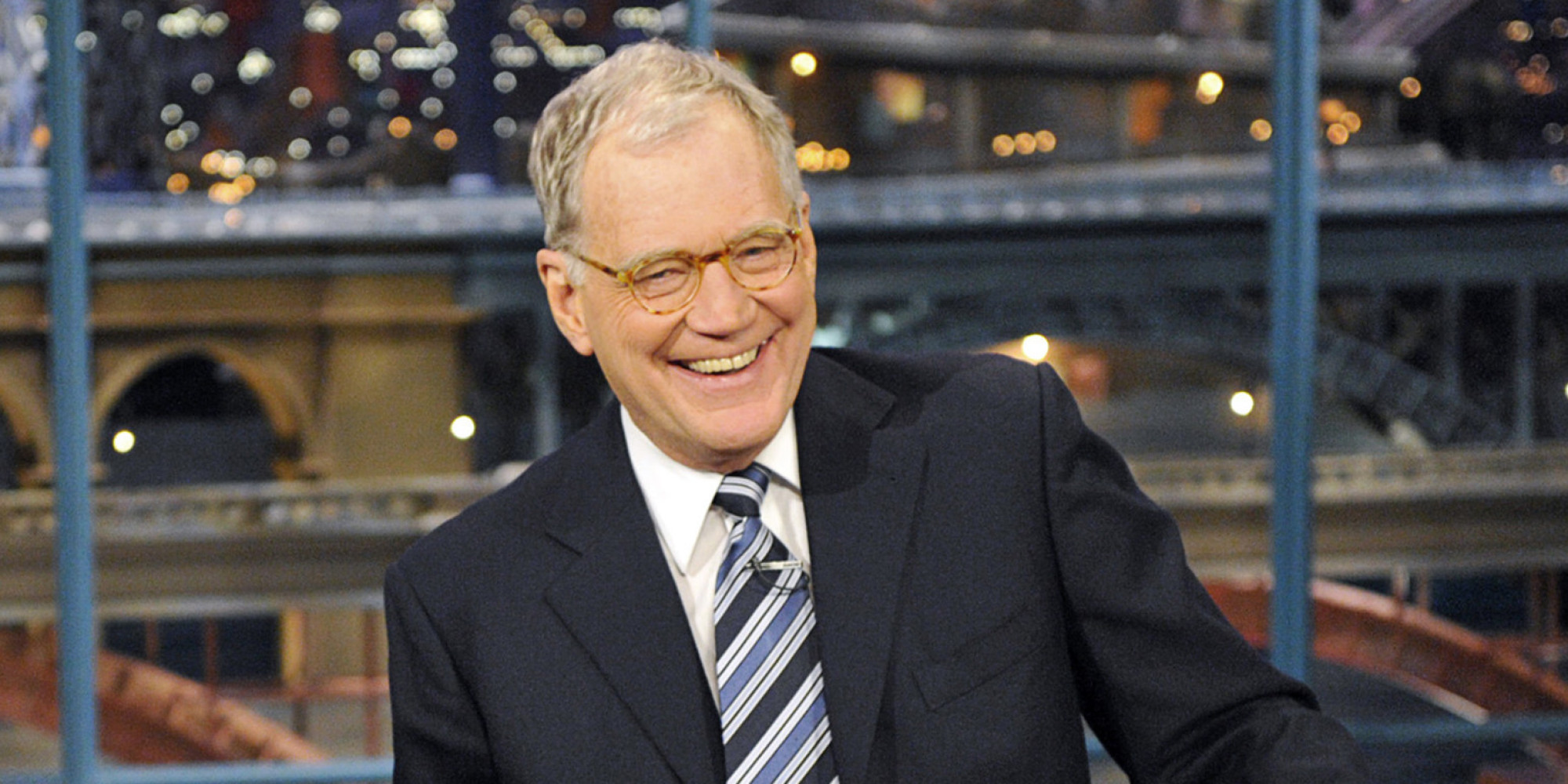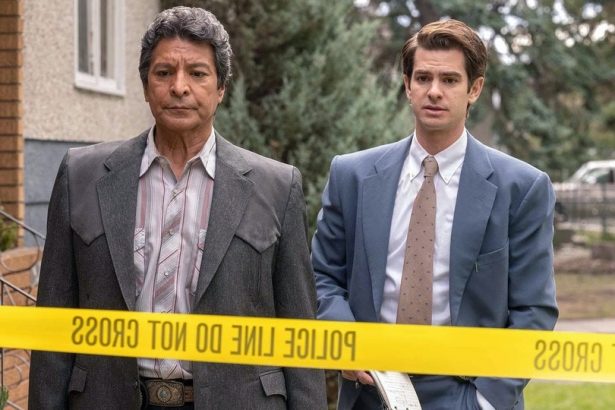It was a fitting end to a riotously funny, ridiculously entertaining era. When David Letterman brought 22 years of his famous Late Show to a close on Wednesday night, everyone from The Simpsons to all the living presidents of the United States came on to pay their comic respects. The Foo Fighters played Everlong, and there was a segment dedicated to all the times he’s blown things up on the show. It summed up everything about a talk-show host who both transcended and epitomised the genre, who sent up the sheer folly of fame, provided a great platform for comedy and music, and could, quite effortlessly, make The Top 10 Things That Almost Rhyme with Peas seem like the most naturally amusing skit in the world.
Look back at his very first attempt at a late show in 1982, Late Night with David Letterman, and there’s something terribly poignant about the exchanges with his first guest (who would also be one of his last): Bill Murray. Both look staggeringly fresh faced, Murray making his name with comedies Meatballs and Caddyshack; Letterman giving celebrity the kind of short shrift that would characterise his career. “Now that you’re famous, is it harder to be funny?” he teases Murray. And in the same segment of the show, the future Ghostbusters star, with a cutting smile on his face, mocks this new undertaking. “You got out of Indianapolis, and didn’t look back,” he gestures, dismissively.
It might have been a gentle retort as Letterman navigated the bear pit that is late-night comedy entertainment on American television, but as he looks back on a career at the very top, it rings true. The man who became an institution, interviewing everyone from Barack Obama to Paris Hilton from behind his famous desk, had no family pedigree in entertainment. His father was a florist; his mother a church secretary. When he graduated from college, he began work as a local radio talk-show host after doing nothing more than seeing a regional television personality and thinking: “I could do that.” But it was his stint in his mid-20s as a weatherman for a local television station that was the real sign of what was to come.
Perhaps realising the farcical nature of a role that required no meteorological skills whatsoever, Letterman began injecting elements of comedy into the forecasts. As an interview in Playboy noted, he would “enthusiastically congratulate” a tropical storm when it was upgraded to hurricane status, predict record-breaking temperatures in made-up cities, and warn of hail the size of “canned hams”.
Somehow, such idiosyncrasies didn’t get him fired; they encouraged Letterman to think he was actually quite good at being a prankster. Good enough, as Murray would note seven years later, to get out of Indianapolis in 1975 and try his luck writing and performing comedy in Los Angeles. Before long, he was in the orbit of two people whose lives would pockmark his career: Jay Leno and the legendary NBC talk-show host Johnny Carson.
It’s impossible to talk about Letterman without Carson. The host of The Tonight Show (essentially the template for any talk show, with its comedy monologues from the presenter, sketches, interviews and musical performances) was, in effect, the reason Letterman was on television at all – not only did he want to emulate Carson, but Letterman actually announced his acerbic brand of stand-up comedy to the nation as a guest in 1978. After Letterman’s first, short-lived stint as an NBC daytime talk-show host in 1980 – where his anarchic comedy garnered Emmy Awards but not huge audiences – Letterman then graduated to Late Night with David Lettermanon the same channel. The subtext was clear: Letterman was being groomed to replace Carson.
It might now seem odd to have scheduled this late-night talk-show directly after Carson’s, and on the same channel, but such was the landscape of American television. Letterman was doing something distinctly different. Where Carson was a safe pair of hands, you never quite knew what was going to happen when Letterman followed him. Sarah Palin and Oprah Winfrey both got on the wrong side of Letterman, while the skits and features were often bizarrely esoteric – if you’ve always wondered what it might be like to be dunked in a tank wearing a suit made out of Alka-Seltzer, Letterman was your man. It genuinely felt like the product of a man who was not only having a lot of fun but also pushing the boundaries of what late-night television could do, all the while gently parodying the entertainment world of which he had become a part.
But that anarchic streak wasn’t palatable to everyone. While Carson was so much of a fan that he used to supply Letterman’s jokes on occasion, when the time came for his retirement in 1992, the gig went to Letterman’s old sparring partner on the Los Angeles comedy scene, Jay Leno.
A more malleable man less likely to be publicly scathing of his bosses, Leno’s appointment undoubtedly hurt Letterman. The most obvious manifestation of his disappointment was his quick exit from NBC for The Late Show with David Letterman on the rival channel CBS, broadcast at the exact time as Leno’s new Tonight Show. While initially ratings suggested Letterman was right to bring across many of the features that had made his NBC show so engaging, Leno’s handling of Hugh Grant’s unfortunate dalliance with Divine Brown, with the famous line “what the hell were you thinking”, won him an audience he never really relinquished.
As the American news and opinion website Breitbart noted this week, it’s easy to argue that while Letterman (wonderfully described in his classic 1980s and early 1990s period as like a “cool older brother”) got bitter and even more caustic, Leno got better. It didn’t help, either, that Letterman’s subsequent role as the Oscars host in 1985 was surprisingly misjudged – why he thought that a skit from his chat show, Stupid Pet Tricks, would work during the most important night in the movie calendar annoyed even Letterman himself for years to come.
Not that there were many other insights into his thought process. For a man seemingly so comfortable in his skin on television every weeknight, Letterman has been surprisingly reclusive. Perhaps that Tonight Show snub nagged away at him – even on his final Late Show this week, his first real quip was “I’ve got a feeling I’m not going to get The Tonight Show.”
A string of stalkers can’t have helped. Or maybe he had just a little too much to hide. Six years ago, Letterman had to make a very public confession from behind his famous desk after a $2-million (Dh7.3m) blackmail plot involving his romantic entanglement with a young former personal assistant became a court case. Embarrassingly, he had just married his long-term girlfriend, the mother of his young son, and as he testily admitted many other affairs with staff, he clearly believed his career was over. Yet the public seemed to respect his honest appraisal of his appalling behaviour.
Clearly, Letterman still had credit in the bank from more than three decades at the very top of his game. Everyone has their own best Letterman memories – probably collated in the style of the Top 10s on his show – but moments such as Joaquin Phoenix’s bizarre spoof interview (which Letterman got wind of and said “Joaquin, I’m sorry you couldn’t be here tonight”) or the disarming but foul-mouthed chat with Madonna in 1994, proved that straight talking goes a long way.
People still remembered how he managed to gauge the mood of the nation perfectly in the days following 9/11. “I don’t trust my judgement on this,” he said, worried. But America did. Voice regularly cracking, he concluded his seven-minute monologue – which had a few laughs – with the words “New York City is the greatest city in the world”. It felt, from that point onwards, that life could go on again.
And talk shows will go on, after this week. While the way most people experience them has changed – these days you’re more likely to catch a YouTube clip that has become a viral hit, like Future Islands’ performance from Letterman last year – the intrigue that surrounds how his replacement Stephen Colbert will fare, or how the British comedian James Corden is doing on The Late Late Show, remains high. The brilliance of Letterman is that he made such nightly fun seem so easy, when in reality, it’s anything but.

